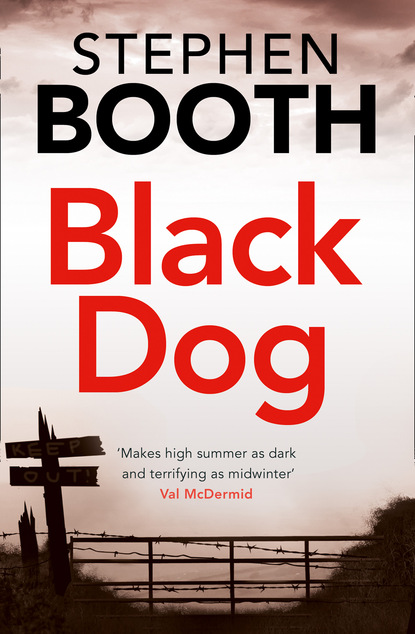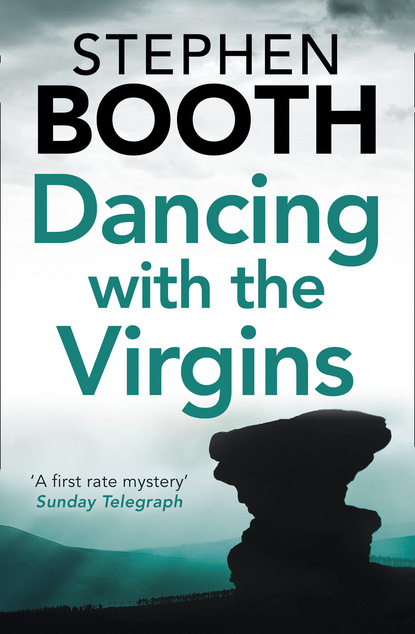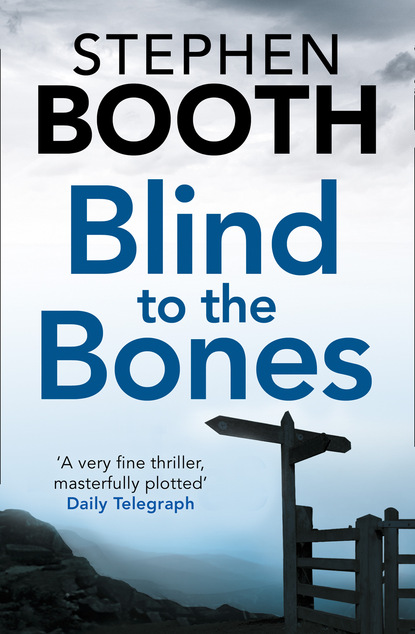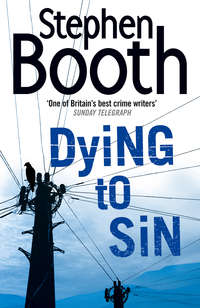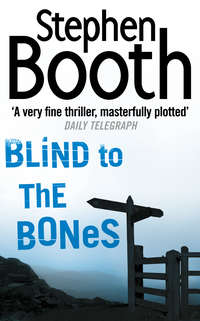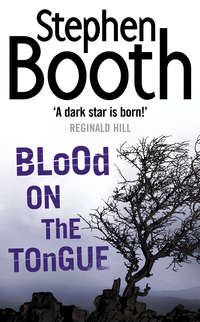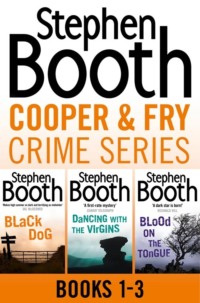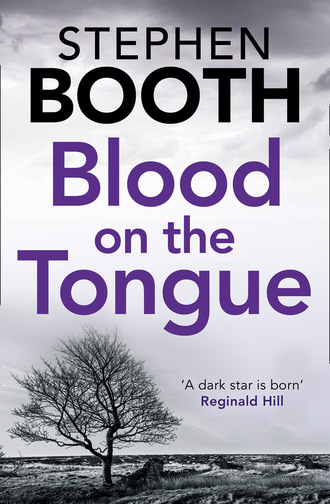
Полная версия
Blood on the Tongue
But there, sure enough, were two slim volumes on Peak District aircraft relics, exactly what he wanted. He wondered if this place was really some kind of Aladdin’s Cave where you could find anything you truly wanted, if you wished hard enough. Lawrence Daley made a strange genie, though.
‘Just the thing, Lawrence,’ he said, when he had made his way back to the counter. ‘I found two.’
‘Amazing,’ said Lawrence. ‘And is there a price on them?’
‘Well, no actually.’
Lawrence sighed. ‘Then I can’t charge you anything at all, can I?’
‘Of course you can.’
‘Not if there’s no label. It’s against the Trade Descriptions Act.’
‘I’m not sure that’s how it works,’ said Cooper. ‘Anyway, I can’t take them without paying you for them.’
‘Well, fifty pence then.’
‘If you say so.’
Cooper began to go through his pockets. He found the estate agent’s leaflets and pulled them out of the way while he felt at the bottom for some change. His pager was vibrating again, but it could wait.
‘Hello,’ said Lawrence, ‘have you fallen into the company of conmen and thieves?’
‘Sorry?’
‘Estate agents,’ he said, pointing at the leaflets. ‘Are you buying a house?’
‘I can’t afford that,’ said Cooper. ‘I’m just looking for a place to rent for a while.’
‘Ah. Striking out on your own? Or is there a live-in partner involved somewhere?’
‘On my own.’
‘Oh. And have you not found anywhere yet?’
‘No.’
Cooper handed over his fifty pence, and Lawrence rattled it into the drawer of his till, then found a striped paper bag from somewhere under the counter. Cooper stood looking at some postcards and fliers stuck to a board near the counter. Most of them were advertising the services of typing agencies, clairvoyants and aromatherapy specialists, but there was one that caught his eye.
‘There’s a furnished flat advertised here,’ he said. ‘It’s in Welbeck Street, by the river.’
‘Oh yes,’ said Lawrence.
‘That’s handy for town. I could walk to work from there. And it sounds quite a reasonable rent, too. Do you know who this person is? Mrs Shelley?’
‘I’m afraid so. It’s my aunt.’
‘Really?’
‘She lives in Welbeck Street herself, but she owns the house next door as well,’ said Lawrence. ‘My uncle had dreams of knocking the two places together and creating some kind of palatial town house to swan around in. God knows why – there were only ever the two of them, with no children.’
‘I have an uncle like that, too – he loves unfinished projects. It seems to give him a sense of immortality. He doesn’t think he can possibly die until all the jobs are finished.’
‘It didn’t work with Uncle Gerald – he died before he could even get round to knocking any walls down.’
‘I’m sorry.’
‘Aunt Dorothy wasn’t. She was over the moon to be rid of him. She had the house next door split into two flats. She had a proper job done of it. I think she wanted the workmen to pound the memories of Uncle Gerald into dust with their sledgehammers and cover him over with a nice layer of plaster and some magnolia wallpaper.’
‘And one of the flats is empty, is it?’
‘It was, when she asked me to put the card up,’ said Lawrence. ‘It might have gone by now, she hasn’t said. I’ve told her to make sure she lets it to the right sort of person. Reliable and trustworthy professional people only, you know. I do worry sometimes about who she might take in, if she’s left entirely to her own devices.’
‘I think I’d be interested, if it’s still vacant,’ said Cooper.
‘It might not be up to your standards, you know. Aunt Dorothy is getting a bit vague in her old age. Not quite barmy or anything, you understand. But vague about life’s little details.’
Cooper looked at the card again. ‘Reliable and trustworthy? Do you think I would qualify, Lawrence?’
‘No, but you could lie.’ The bookseller laughed. He reached out a hand and patted the corduroy collar of Cooper’s waxed coat. ‘I love the cold-weather gear, by the way,’ he said. ‘Policemen usually dress so boringly, don’t they? But the cap really suits you. It shows off your eyes.’
Cooper edged away a few inches. ‘I might give the flat a try,’ he said. ‘Mrs Shelley, 6 Welbeck Street? I’ll mention that you recommended me, shall I?’
Lawrence chuckled. ‘Believe me,’ he said, ‘you’d be better off lying.’
On the way out, Cooper noticed a morocco-bound volume of A Tale of Two Cities, which lay in the dust on the top of a set of shelves. It looked almost as if Mr Dickens himself had wandered into the shop one day and put the book down on the shelf, where it had stayed ever since.
Outside, in High Street, Cooper watched a Hulley’s bus splash slowly by like a dark blue ship. It threw a bow wave of slush to either side, which threatened to sweep away the pedestrians walking on the pavement.
As he walked back past the Clappergate shopping precinct towards West Street, Cooper patted his pockets thoughtfully. In the huge poacher’s pocket inside his coat were the books on Peak District aircraft wrecks, including the crash of Lancaster SU-V, which had brought Alison Morrissey to Edendale. In another pocket he had the estate agent’s leaflets for unsuitable properties. Cooper knew he didn’t really want to live on his own. He was moving out of Bridge End Farm because he felt so strongly it was time for a change in his life – and that was all.
He wondered whether Alison Morrissey lived on her own. Probably not. And she was nothing to do with him, anyway. She was in Edendale only as a passing visitor. Soon, she would be flying back to Canada, to an entirely different world, and he would never see her again after today. But perhaps he could hope that there was a person a bit like Alison Morrissey, waiting for him somewhere.
7
Diane Fry was waiting for Ben Cooper when he arrived back at divisional headquarters in West Street. She glared at him as he came into the CID room.
‘You didn’t answer your phone,’ she said.
‘I was in the middle of something,’ protested Cooper. ‘I was going to call you back. How’s the double assault case shaping up?’
‘Oh, you can forget about that for now.’
‘Forget it? There were a couple of serious assaults, wounding with intent, possession of offensive weapons Not to mention being potentially racially motivated
‘Yeah, yeah, and somebody probably dropped some litter on the pavement as well when you weren’t looking. Forget it.’
‘But, Diane –’
‘Add it to your pending file, Ben. We’ve got more important things to do.’
‘What’s so important? Have we got another body or something?’
‘What’s so important,’ said Fry, ‘is that we’ve got a meeting on the Snowman case. It just became a murder enquiry.’
Without really thinking about it, Ben Cooper had expected E Division’s new Detective Chief Inspector to be female. If not, then a member of an ethnic minority. Or at least gay. It was almost inconceivable that a senior appointment had been made without an attempt to address the balance of gender, ethnicity or sexual persuasion.
But no matter how carefully Cooper studied DCI Oliver Kessen, he still seemed to be a middle-aged white man with receding hair and bad teeth, an ill-fitting suit and a paunch. Seated next to their old DCI, Stewart Tailby, Kessen was the centre of attention for the entire room. It was the first time anybody there had set eyes on him, though he had only come from D Division, which wasn’t exactly Australia.
‘Good afternoon, everybody,’ said Kessen. ‘Glad to meet you all. Is everything under control?’
Several people opened their mouths to reply, but didn’t manage to get a word out when they saw the expression on DCI Tailby’s face. He looked like a headmaster who had warned his pupils not to talk to strangers.
‘Yes, I’m sure it is,’ said Tailby.
‘Well, I’ve just arrived and I’ve got to settle in here, so I rely on you people to bring me up to date. But I dare say everything is going smoothly. I can see Mr Tailby has been running a good team.’
The new man nodded round the room, trying to make eye contact with as many officers as possible. Cooper saw several of his colleagues freeze like rabbits caught in car headlights, their social skills failing them disastrously when faced with suddenly conflicting demands from two equal-ranking senior officers. Kessen must have thought he had walked into a waxworks from the amount of response he got. With the right lighting, it would have made a tableau for the chamber of horrors.
It was always a bit awkward when new bosses came. But it had been Stewart Tailby’s own decision to move on, to take up a desk job at headquarters. So he could hardly object to the new man’s arrival, and he could hardly resist having his successor sitting next to him and addressing his staff. Kessen was too inexperienced to be Senior Investigating Officer on a major enquiry. So until E Division got a Detective Superintendent to be its new CID chief, Tailby was trapped. There were others here who had expected to get Tailby’s job when he moved, but that was a different matter. It was no use telling them not to be resentful.
‘As some of you know, we have the preliminary results from the postmortem examination of the unidentified body of an adult male found on the A57 Snake Pass,’ said Tailby. ‘As a consequence of those results, we have opened a murder enquiry. I appreciate that all of you here have other enquiries on which you’re engaged, and I don’t need telling that we’re short of manpower. We’re hoping to get some help from other divisions, and the Chief is on the phone right now. But I have to tell you that everybody seems to be in the same boat as regards resources.’
It was true that the room seemed more sparsely occupied than for any major enquiry Cooper could remember. It was ironic that the crisis in manpower should coincide with an unidentified murder victim and a serious assault with multiple suspects. There was a lot of routine slog involved in those cases, and not many people to do it.
‘DI Hitchens and DS Fry will fill you in with what information we have so far,’ said Tailby.
The Snowman’s blue bag was on the table at the front of the conference room, wrapped in latex to preserve it as evidence. Everyone kept glancing at the bag, as if somehow it might tell them everything they needed to know. Paul Hitchens stood up and prodded it with a finger.
‘The bag was found with the body by the snowplough crew,’ said Hitchens. ‘It’s a common make, though not cheap. One of the first jobs will be to trace shops in the area that sell this type of luggage. Unfortunately, there are no labels on it, and no contents to help us identify the owner.’
‘The bag was completely empty?’ asked Cooper.
‘There was so much empty space inside this bag, you’d think it was a Derbyshire CID room,’ said Hitchens. ‘Except it smelled better.’
Cooper saw DCI Kessen’s eyes open a little bit wider. He stared at Hitchens, then turned to Tailby, who ignored him. For the first time that morning, a small smile had crept on to Tailby’s face.
‘Somebody went to great lengths to remove evidence of his identity, then,’ said Cooper.
‘Yes and no,’ said Hitchens. ‘They removed the clothes from the bag, but left him with what he was wearing. They took his wallet and maybe his mobile phone, if he had one, but left the contents of his pockets. In fact, why did they leave the bag itself? If the perpetrators handled it, they were taking a risk. Why not dispose of it with the clothes? It doesn’t really make sense.’
‘What about missing persons?’ suggested DCI Kessen.
‘I’m sure that’s under control, too,’ said Tailby.
‘Of course. Who’s dealing with it, I wonder?’
Gavin Murfin tentatively raised a hand. His mouth was full of chocolate, and he began to chew a little bit faster as both chief inspectors turned their attention on him.
‘This is Detective Constable Murfin,’ said Tailby.
‘Good afternoon, Murfin,’ said Kessen. ‘DC i/c mispers, eh?’
Murfin’s mouth opened. But all that came out was the sound of masticated food and a faint choking at the back of his throat.
‘Anything worthwhile, Murfin?’ said Tailby.
‘No, sir. There’s a list on file, but nothing that jumps out at you, like.’
‘National forces?’
‘They’ve all been circulated,’ said Murfin. ‘There’s some we haven’t had a response from yet.’
‘Keep on to it, Murfin.’
‘Yes, sir.’ Murfin seemed to realize that his hand was still in the air. He lowered it, looking round at his colleagues in embarrassment.
‘And who’s the lady?’ said DCI Kessen suddenly. Everyone looked round at the door, wondering who had walked into the room. But there was no one there. Cooper kept his eyes straight ahead and saw DCI Tailby’s jaw tense. There was only one woman in the room this afternoon, and she was no lady – she was Diane Fry. Eventually, a few officers managed to follow Kessen’s gaze and realized who he was looking at. He was smiling, and he had raised one eyebrow at a jaunty angle, a mannerism he must have practised while watching Sean Connery videos.
It was Fry herself who answered him. She got out of her chair and stood up to speak. Nobody else ever bothered doing that during a meeting.
‘Detective Sergeant Diane Fry, sir.’
‘Good afternoon, Diane. And what are you working on?’
‘DS Fry is one of my best officers,’ said Tailby, his expression tightening ominously.
‘I’m sure she is. She looks it. But I rather think she’s one of my officers now, Stewart.’
‘We’ve circulated a description of the man to all the media and have appealed for information,’ said Fry coolly. ‘We’ve also had officers out at checkpoints on the A57, stopping motorists in the vicinity who might have seen something. We are also seeking sightings of a four-wheel drive vehicle in the area around the time that the body was dumped. And, naturally, we’re following up leads from the man’s physical appearance, his clothing and his possessions. His clothing seems to offer us the best chance at the moment.’
DCI Kessen nodded and smiled approvingly.
‘We also have a small tattoo on the left forearm of the body,’ said Fry. ‘A dagger and a snake. It’s a common motif, but it might help identification.’
‘I’m sure you’ll do an excellent job, Detective Sergeant Fry,’ said Kessen. ‘An excellent job.’
‘Shall we move on?’ said Tailby. ‘There’s a lot to do today.’
Fry turned round so that she could see Cooper and Murfin. They were careful not to smile.
‘Explain the timing for us again,’ said Tailby.
Fry set out the time line – the narrow window in which the killer or killers had the opportunity to dump the body on the Snake Pass without being seen.
‘So we’re looking for a four-wheel drive vehicle, almost certainly,’ she said.
‘There are lots of those around.’
‘Eddie Kemp has one, for a start,’ said Murfin.
‘Who?’ said Tailby.
‘The bloke that we had in on suspicion for the double assault.’
‘Really?’
‘Do we have a suspect in custody?’ asked Kessen. ‘I didn’t know this. Whose arrest was it?’
‘Mine,’ said Cooper. ‘But it was a completely different incident.’
‘Are we sure of that?’
‘It happened the same night,’ said Murfin.
Cooper hesitated. ‘There’s no obvious link. Except for the timing.’
‘He has an Isuzu Trooper. I’ve seen it parked outside when he’s been doing the windows.’
‘Doing what?’
‘He’s a window cleaner,’ said Murfin. ‘But anyway, he isn’t in custody any more – he’s been sent home. He’s had his twenty-four hours.’
Tailby pulled a face. Too often it had been known for the police to have a suspect in their custody, only to release him before the crucial evidence turned up to justify a charge. ‘We’d better be absolutely sure there’s no link,’ he said. ‘Someone check that out.’
Cooper realized he was the one the DCI was looking at. ‘Yes, sir,’ he said.
DI Hitchens interrupted. ‘We’re currently tracking down some CCTV footage. In view of the location of the assault, we’re hoping either the suspects or the victims might have been caught by one of the town centre cameras.’
‘That’s good,’ said Tailby. ‘Now let’s have some attention on identifying the Snowman. It’s going to be a long haul. Without an ID, we’re in difficulties. We need to get assistance from the public, of course. But since he’s probably not from this area, that’s going to take some time. That means there are plenty of jobs to do. Mr Kessen thinks everything is under control, so let’s not disappoint him.’
Diane Fry looked distracted. Ben Cooper leaned over towards her as the meeting broke up.
‘Whoever killed the Snowman, it sounds as though we’re looking for amateurs anyway,’ he said. ‘They weren’t thinking things through properly. There’s no logic to what they did. No system, no planning. That’s good, isn’t it? It means they’ll be worrying now about what traces they left behind.’
Fry shrugged. ‘That’s not quite true. The timing of it looks planned. Somebody thought that through, all right.’
‘Unless they were just lucky.’
‘There’s not much we can do about luck, Ben.’
‘Yes, there is,’ said Cooper.
‘What?’
‘We can get lucky ourselves.’
‘Yeah, right.’
But Ben Cooper believed in luck. He believed that, if you worked hard enough and long enough at something, then eventually luck would start to operate in your favour.
What Cooper failed to realize was that he had already been given the most important piece of luck he would get that week.
After the enquiry teams had been hastily assembled, Cooper walked back from the incident room with Diane Fry and Gavin Murfin. The only sound between them was Murfin humming to himself. Cooper listened, trying to identify the tune. It sounded like an old Eagles song, ‘New Kid in Town’.
‘Well, a new broom sweeps clean,’ said Murfin as he reached his desk and began to hunt through his drawers. ‘So my old mum used to say, like.’
Cooper saw that Fry couldn’t bring herself to say anything. She was pale and held herself rigidly, as if she were freezing cold. And it was cold in the incident room, too. You could have broken up the air with an ice axe.
‘Always the optimist, aren’t you, Ben?’ she said. ‘You talked about getting lucky. Well, take a look around you. We’re at rock bottom for resources and we have an unidentified body on top of all our other enquiries. We have a new DCI, the Chief Super is cracking up, and Gavin here is our number one asset. Even the weather is against us. Does it look as though we’re likely to get lucky?’
‘Well, you never know.’
‘Do you think we could persuade Mr Tailby to stay on?’ said Murfin.
‘I don’t think it would take much to persuade him,’ said Cooper. ‘He’s not really all that keen on the HQ job.’
‘He’s even less keen on the new DCI.’
‘Mr Kessen will settle down, Gavin.’
‘It could take time, I reckon. I don’t know, Ben – they call some of us old coppers dinosaurs. But it’s like a proper Jurassic Park on the top corridor sometimes.’
‘So why did you bring up Eddie Kemp? Trying to score some points with the new DCI? Kemp has nothing to do with it, has he? What have you got against him?’
‘Maybe he didn’t clean my windows properly,’ said Murfin. ‘Well, I don’t know. Kemp and his mates might have been cruising for victims. Got the taste for it with the other two, then picked some poor bugger up at the roadside out of town.’
‘I talked to Kemp’s wife,’ said Cooper. ‘According to her, he didn’t come home at all that night. He went to the pub at eight o’clock and she knew nothing until she got a call next morning to tell her he was in custody. She also says the Isuzu was gone all night. According to her story, somebody brought it back early next morning and put the keys through the door.’
‘One of Kemp’s associates, presumably, since he was in custody at the time,’ said Fry.
‘Presumably. But we ought to check.’
‘Does Mrs Kemp know her husband’s friends?’
‘Knows them, but doesn’t want to, I’d say.’
‘No names supplied?’
‘No. She’s not happy, but she’s not giving evidence against her husband. The two victims might be more help when we can get full statements from them, but I doubt it. They’re part of the Devonshire Estate gang – they think talking to the police is like committing suicide. So all we have against Eddie Kemp is the identification of the old couple who looked out of the window and say they recognized him as part of the group. You know how reliable witness identifications are in those circumstances. Eddie himself says if he hit anybody, he was acting in self-defence.’
‘I don’t suppose he’s identified the other three?’
‘Are you kidding? Somebody is going to have to enquire into his associates.’
‘God knows who,’ said Fry. ‘And God knows when.’
‘I bet it’ll be me,’ said Cooper. ‘I seem to have got Kemp’s car on my list.’
‘Hey,’ said Murfin, ‘did you realize that the new DCI’s name is Oliver?’ He held up the rubber lobster of the same name.
‘Are you telling us it’s a coincidence, Gavin?’
Diane Fry had been tapping her fingers on her desk. Now she seemed to make a decision, shake her head and was suddenly her proper self.
‘You’d better go and take a look at his car, then, Ben,’ she said. ‘And take Gavin with you.’
‘I’m on missing persons,’ said Murfin.
‘Let the allocator know where you’re up to, then you’ll have to leave it for an hour or two. Ben can’t go to see Kemp on his own. He’s doing enough solos as it is.’
Murfin left, grumbling all the way. With a spasm of concern, Cooper watched Fry as she stared out of the window for a while, the muscles at the side of her mouth tight with tension. She fiddled at a strand of her fair hair in an uncharacteristically uncertain gesture. Her hand was pale and slender, with tendons that he could have traced with his finger.
‘A new broom sweeps clean?’ she said. ‘I’ll stick a broom up his arse.’
Cooper nodded. He didn’t think she was talking about Gavin Murfin.
8
The Buttercross area of Old Edendale had its own personality, its own picturesque gloss, which had been carefully polished and maintained over the years for the benefit of visitors. It was here that the town’s antique shops clustered, some of them stuffed with gleaming mahogany furniture and brassware, but others dim and dusty, with nothing in their windows but a few coloured bottles and a Queen Victoria diamond jubilee biscuit tin.
There were shops here that Ben Cooper had never seen open, not in all his life spent in and around Edendale. Today, as usual, the ‘closed’ signs hung on their doors, with no indication of when their owners would be available to do business. Maybe they only appeared on special occasions, such as bank holiday weekends, when tourists thronged the Buttercross with money to spend. Maybe the dealers sold enough bottles and biscuit tins on those days to see them through the rest of the year. On the other hand, maybe they all had proper jobs to do.
The Buttercross certainly lived up to the tourist brochure image this afternoon. The lying snow and the weathered stone and mullioned windows of the buildings hit just the right Dickensian note to set off the antique furniture. Sadly, there were no tourists in January to appreciate it.
Between two of the shops, a narrow street lurched suddenly uphill. There were steel handrails set into high limestone walls on either side for pedestrians, but no pavements to separate them from any cars that might scrape their way round the corner. The walls had been the traditional dry stone when they were first built. But now they were held together by mortar, and they had periwinkles growing out of their cracks – forlorn green strands encased in frozen snow.


